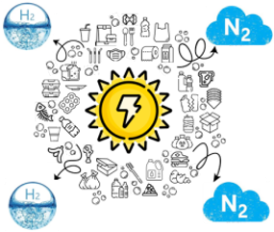Sustainable Chemistry and Quantum Technologies
Organo-f-Synthesis
Group Agenda





Conversion of plastics into low molecular weight carboxylic acids
Photo-reforming alcoholic residues for hydrogen production
Photo-conversion of oils and biomass wastes into hydrocarbons
This project is led by Dr. Grégory Danoun with Grégory Nocton. The objective is to use the specific design of catalysts to produce hydrogen from molecules contained in food wastes. Alcohols, long-chain carbon carboxylic acids, and urea are prime targets. The project is financed by the Defense Innovation Agency and by a pre-maturation program at Institut Polytechnique de Paris
The photo-conversion of plastics to fatty acids is a promising innovation in waste management and environmental sustainability. This process involves using light energy to break down plastic polymers with an adapted metal catalyst into smaller molecules with alkyl chain lengths of C10 to C16 with one or several double bonds (fatty acids). Once transformed, the fatty acids can then be digested by a dedicated bacterial environment: research performed in collaboration with several groups of experts in bacterial evolution and protein design around Paris. We are looking at metal photo-catalysts that could be soluble in water to tackle the important challenge of micro-plastic residues. The project is led by Grégory Nocton with Grégory Danoun and collaborators in the Paris area.
Biomass feedstock such as oils, acetic acid, etc... can be photo-catalytically transformed with various photo-catalysts that we make in the laboratory. Particularly, we concentrate on cerium and uranyl complexes.
More to come soon on this topic

PREMAT'
